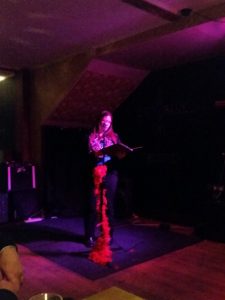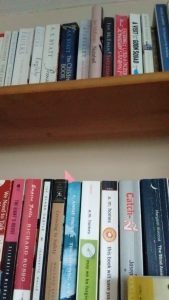This Week’s Bit of String: What circumference and cucumbers have in common
The first literacy group I led consisted of four fairly proficient Year Seven readers. In one task, they had to construct vocabulary words out of individual sound chunks. ‘Circumference’ was one of those words.
The second syllable drew giggles from the boy with the most tumultuous home life. I informed him, ‘That’s a very important sound chunk. Just think, without “cum” in our cucumbers, we’d only have cubers!’
He literally fell off his chair laughing.
Hopefully with that one remark I communicated four things: It’s okay to acknowledge sex, it’s okay to laugh about sex, we can even be fairly clever with it, but we don’t have to go on about it forever.
Perhaps sex scenes in literature should follow similar guidelines. We all know that sex scenes are notoriously easy to do badly. But it’s such an important part of life, it figures in almost every story, whether in the background or upfront. How much should it be detailed? Do graphic scenes enhance or detract from literature?
Sex as a Genre

This past weekend I had a terrific time reading at a Stokes Croft Writers event in Bristol, built around the theme of ‘bad erotica.’
Now, I don’t actually read erotica, much less write it. But I’d written a piece called ‘The Hornet,’ which dripped with innuendo. So, that worked. A few of the others were more explicit, and they were all engaging and often quite funny, clearly written by talented humorists and wordsmiths.
It’s a privilege to laugh about sex, and to laugh about it together in a room full of people. To me, it felt like an intellectual release, if not a physical one.
Some of the descriptions were a bit cheesy, or a bit gross. But let’s face it, sex can be too. Right? I admire people, in any genre, who take on this, erm, sticky subject.
Sex in the Classics
Going back a century or two, you don’t find many explicit sexual scenes in literature, for obvious societal reasons. But where would many of those classic stories be without such escapades going on in the background? Bleak House, Hunchback of Notre Dame, Anna Karenina, even Pride and Prejudice.
It makes sense that as twentieth century literature pushed towards greater honesty with the reader, sex became featured more bluntly.
However, there’s also an emphasis in contemporary literature on showing rather than telling; on pared descriptions and enhanced subtlety. In a way, that might serve to cloak lengthy, open sexual scenes.
I’m okay with that personally, since my aims in reading are much broader than satisfying any physical desire. But it interests me how the dichotomy between honesty (including a wilfulness to shock) and sparsity affect our ability to write about sex.
Crafting Sex Scenes
Writing about sex needs to be approached like any other aspect of a story: fearlessly but thoughtfully.

Surely the key to creating sex scenes that aren’t hopelessly daft is to stay in character. Continue using language the character would use. Include only details that further the plot and the message the character wants to convey.
An article in Lit Hub provides an interesting survey of writers who pen effective sex scenes. ‘Many great novels portray sexual encounters as an inseparable part of the extraordinary ordinariness of daily life….as bodily, emotional experiences that inform each character’s unique sense of what it means to be alive.’
Contrasting scenes in Isabel Allende’s House of Spirits, Andrea Levy’s Small Island, or Louis de Bernieres’ The War of Don Emmanuel’s Nether Parts (that mango scene!), each give sexual encounters from different points of view and/ or at different stages in a character’s timeline. Those differences are marked in the tone and the coverage of the encounter.
One somewhat explicit scene I’ve written is told by an adolescent boy annoyed with his older stepbrother’s noisy nighttime antics on the sofa and determined to stop it. He encounters the scene:
‘There had to be more to sex than this. Piggy grunts. Flab dangling, limbs twitching, glowing orangey-pink in the light of the last lamp standing. Weren’t they getting sliced by old potato chip pieces? No, those chips must be soggy now.’
With that point of view, I’m freed from having to dwell long on the subject, but at the same time, I get to tell it like it is. Hopefully I’ve managed to strike that balance between leaving some to the imagination, and realistically, fully portraying my character.
How have you addressed writing about sex? Are there any writers you feel are particularly good at it?